Down Ticket #21: Senate candidates finally face off in debates
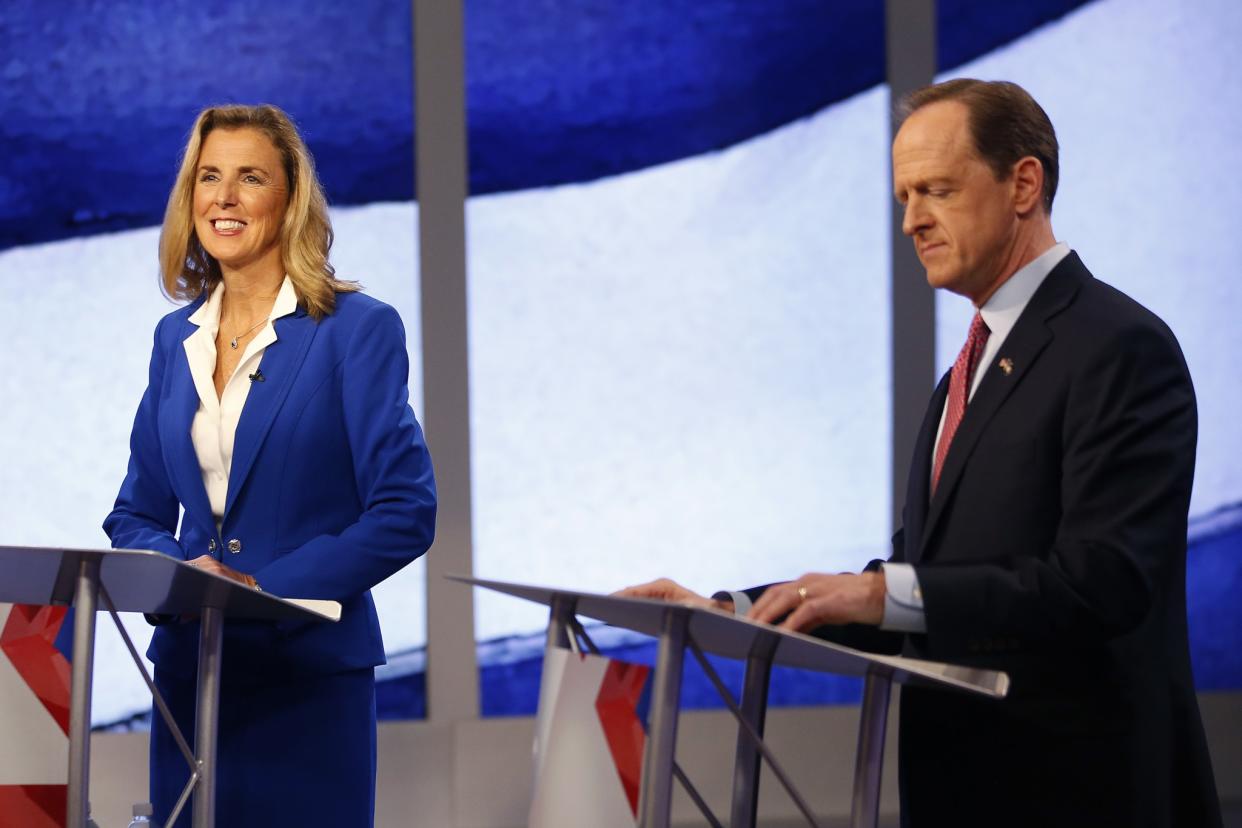
Down Ticket is Yahoo News’ complete guide to the most fascinating House, Senate and governors’ races of 2016. Coming to you every Tuesday and Thursday until Nov. 8. What you need to know today.
_____
PITTSBURGH — Some of the most competitive Senate races in the country have seen their first rounds of debates during the past week.
Considering the relatively low profile of these events, it’s likely that most won’t matter in the final tally, but they provide a chance for candidates, who have been unloading on each other with a deluge of ads, to deliver those same attacks face-to-face.
The key debate task for candidates: Do no harm. They must avoid any statements that might find their way into fresh commercials or proliferate on social media. Some Republicans who have yet to fully withdraw their support from Donald Trump also face the issue of attempting to delicately walk the line of disavowing his most controversial statements while stating they still believe he should be in the White House.
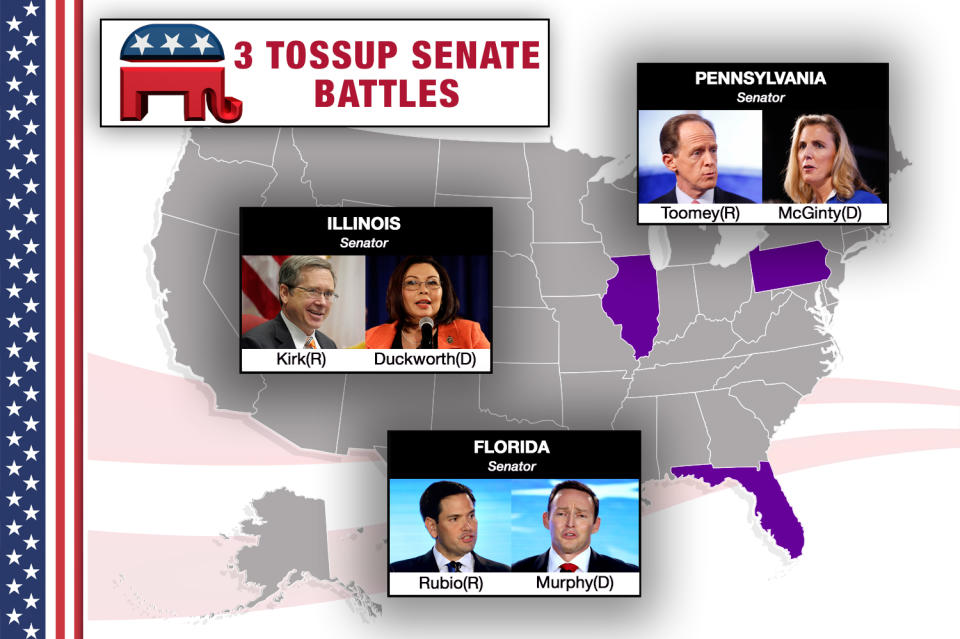
Pennsylvania is home to one of the tightest and most expensive Senate races, with incumbent Sen. Pat Toomey defending his seat against Democratic challenger Katie McGinty. At least $89 million has been spent by the candidates and outside groups backing them, and that number is likely to continue rising, as polls show a dead heat. Between Pennsylvania’s swing-state status in the presidential race and the Toomey-McGinty race, it’s difficult to listen to the radio or watch television in the Keystone State for more than a few minutes without being exposed to some sort of campaign ad — a fact Toomey acknowledged.
“It’s getting hard to watch TV,” he said Monday afternoon while speaking in Pittsburgh, the location of the first of two scheduled debates with McGinty.
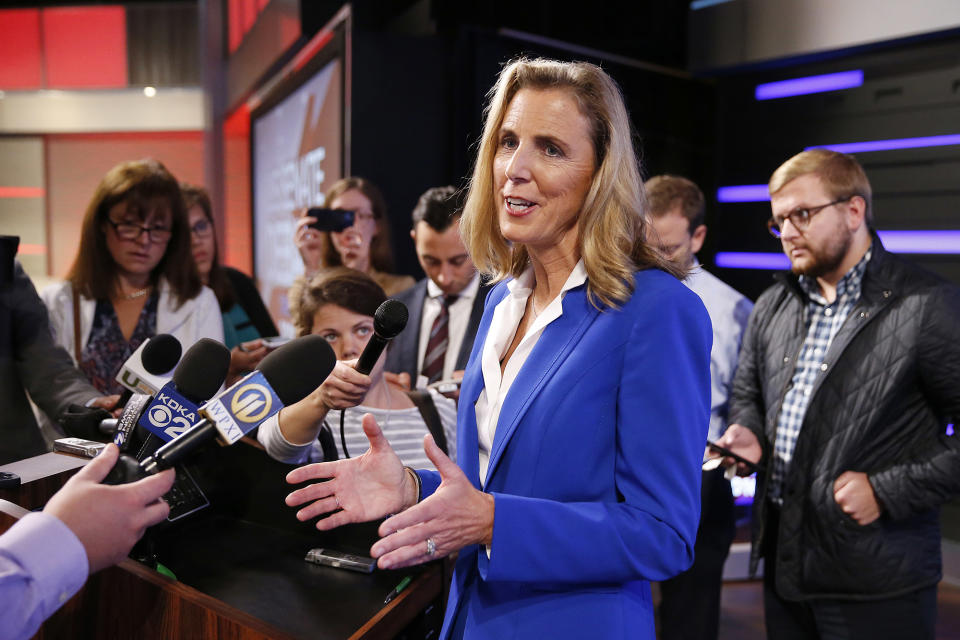
The two spent much of their hour at KDKA studios rehashing attacks that have been used on the airwaves, but there were other clear goals for the candidates. For Toomey, it was attempting to continue to walk that fine line of his Trump stance: supporting the nominee without a full endorsement or saying whom he will actually vote for on Nov. 8. For McGinty, a relative novice in just her second campaign after falling in 2014’s Democratic gubernatorial primary, her goal was to look polished in her first general-election debate.
Toomey reiterated his awkward Trump position repeatedly over the course of the hour and again in a post-debate media availability. The senator said that although he has many issues with Trump’s candidacy, he believes a President Trump would be willing to sign Republican-backed legislation to help Americans. When pressed by McGinty and moderator Ken Rice on whether he’d ever let Pennsylvanians know his choice for president, Toomey said, “At some point I probably will.”
Later, when asked about Trump’s comments regarding voter fraud in Philadelphia and the sanctity of the election, Toomey delivered a strong rebuke about the importance of trust in the electoral process and honoring the results. In recent days, Trump has repeatedly suggested that there was a global conspiracy rigging the November election against him.
“Our elections may not always be completely perfect, but they are legitimate. They have integrity, and everyone needs to respect the outcome,” said Toomey.
Toomey and McGinty also discussed gun safety regulation, which has been a curveball factor in their race. After joining Democratic Sen. Joe Manchin of West Virginia in an attempt to expand background checks in the wake of the Sandy Hook shooting, Toomey earned the support of former New York Mayor Michael Bloomberg and former Arizona Rep. Gabby Giffords’ anti-gun-violence PAC. (Bloomberg’s PAC, Independence USA, has spent $3 million on the Pennsylvania Senate race.) McGinty claimed during the debate that after the Manchin-Toomey gun amendment failed, Toomey gave up too quickly on the push for legislation.
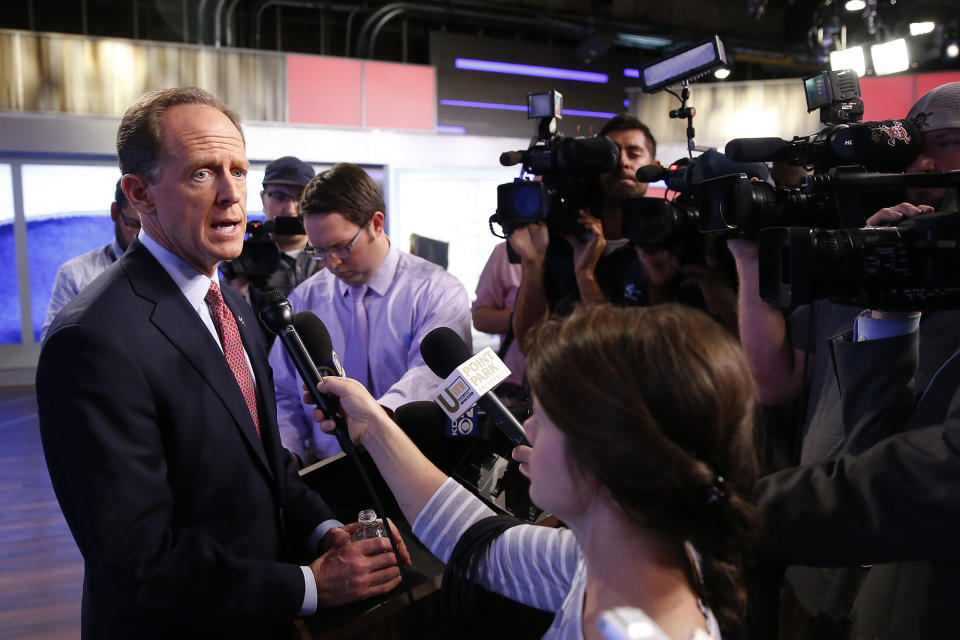
The only potential gaffe from the afternoon taping came when the conversation turned to police/community relations. After Toomey had reeled off a list of law enforcement agencies that had endorsed him, McGinty — whose father was a police officer — said she had also been endorsed by such agencies. She didn’t specify which one during the debate, but her campaign said she was referring to the Pennsylvania chapter of the International Union of Police Associations (IUPA). The national chapter of that organization endorsed Toomey in March, and there is no Pennsylvania chapter, but the Pittsburgh unit did endorse McGinty earlier this year, per the group. In a normal race it would seem unlikely such a minor slip-up could be used for attack-ad fodder, but with the amount of money coming into Pennsylvania, it would be unwise to rule anything out.
But Toomey vs. McGinty was not the only competitive and expensive Senate race in a swing state to have its first debate on Monday. In Florida, incumbent Republican Sen. Marco Rubio attempted to reassert his lead in his race with challenger Rep. Patrick Murphy, a two-term Democratic congressman. Polls show Rubio leading by roughly 4 points, with the race has tightening slightly in recent weeks. Rubio, who competed with Trump for the Republican nomination, has criticized the Manhattan developer’s individual actions and character traits but still says he still supports him for the presidency.
Much like their Pennsylvania counterparts, Rubio and Murphy spent the first 10 minutes bashing each other on the presidential race. Murphy mentioned Trump in his opening statement and then again in his first answer. Rubio’s first and second questions were about Trump. The senator said that while he disagrees with Trump on many things, he disagrees with Democrat Hillary Clinton on everything and wished America had better choices. After Rubio mentioned Clinton’s email server, he was asked “Would you trust Donald Trump with classified information?” by moderator Jonathan Karl, eliciting laughter from the crowd. (Rubio had previously said he would not trust Trump with the nuclear codes.)
Murphy’s campaign quickly shared video of the exchange:
When asked later about Trump’s claims of a fixed election, Rubio echoed Toomey in saying the nominee should stop making those allegations. “This election is not being rigged,” Rubio said. He cited as impediments to Trump’s conspiracy theories the impossibility of rigging an election in Florida’s 67 separate counties and the state’s Republican governor . “There is no evidence behind any of this, so this should not continue to be said,” he added.
Rubio was also pressed on whether he would serve a full term in the Senate or run for president again in 2020. It’s an issue in Florida because the senator had said throughout the 2016 presidential primary that he would not run for re-election for the Senate. But after Trump clinched the GOP nomination, Rubio re-entered the race just before the June deadline. At the Monday debate, he promised to serve his full six-year term.
“I’m going to be a senator for the next six years on behalf of the state of Florida,” said Rubio when asked a fourth time. “You can’t be a senator and president at the same time. So I am running for the United States Senate. I’m going to serve six years, God willing.”
Murphy attempted to mention Trump at every instance, but found himself under attack by Rubio for his seemingly opportunistic jump to the Democratic Party and change in district prior to the 2012 election, when Murphy launched his congressional career. In an echo of Toomey’s attempt to paint McGinty as being too partisan because she supported her party’s nominee without reservation, Rubio mocked Murphy for having 100 percent faith in Clinton despite the various controversies surrounding her.
If these Senate debates are any sign of what to expect in the next three weeks, candidates will increasingly tie their rivals to Trump or Clinton at the top of the ticket. Both McGinty and Murphy responded to a variety of attacks by bringing up Trump, foreshadowing their stretch-run strategy, while Toomey and Rubio are expected to try to paint their independence against whoever wins the White House as a positive. Both campaigns will feature at least one more debate, including one conducted between Rubio and Murphy in Spanish.
______
Tribune endorsement a ‘sucker punch’ to Senator Kirk
On Friday, the right-leaning Chicago Tribune editorial board chose to endorse Democratic Rep. Tammy Duckworth in the 2016 Illinois Senate race. The paper’s provocative argument was not that it disagreed with incumbent Republican Sen. Mark Kirk’s policies, but that its editorial board members were concerned he had not fully recovered from a 2012 stroke.
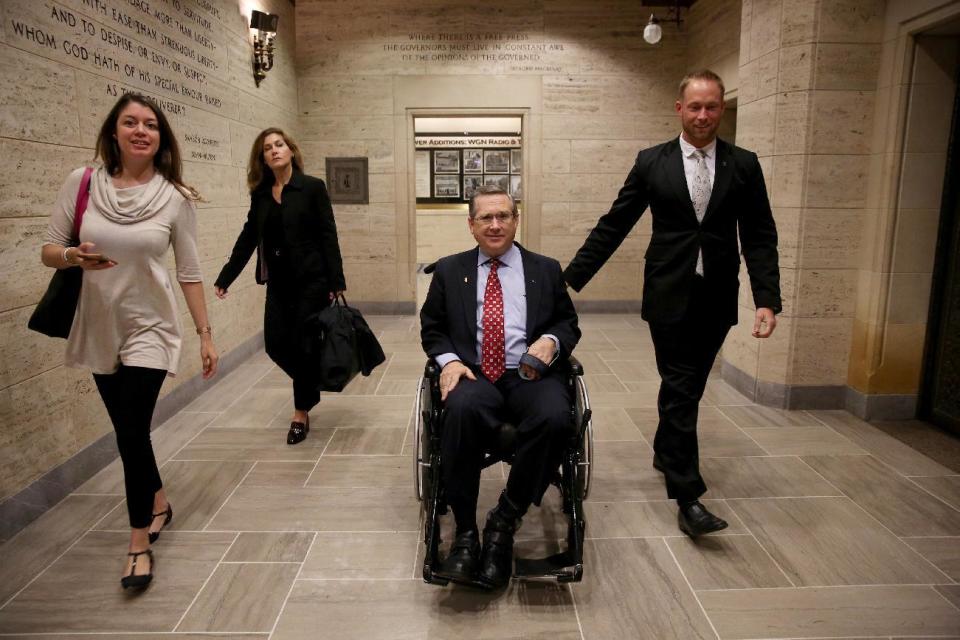
Republican Sen. Mark Kirk leaves the Chicago Tribune Tower after meeting with the editorial board. He and Democratic Senate candidate Tammy Duckworth debated Oct. 3 at the newspaper’s offices. (Photo: Nancy Stone/Chicago Tribune via AP)
“We are saddened to say we did not see that energetic, policy-driven Kirk when we met with him Oct. 3 for an endorsement interview,” read the editorial. “You’ll find the video of that meeting here: chicagotribune.com/senatedebate. Additional reporting confirmed that the senator isn’t as influential an advocate in Washington as he was for more than a decade.”
It continued: “While a stroke by no means disqualifies anyone from public office, we cannot tiptoe around the issue of Kirk’s recovery and readiness. His health is a fundamental component of this race — a hotly contested matchup that could return control of the U.S. Senate to Democrats. We aren’t physicians; Kirk’s doctor attests to his good cognitive health. But we are voters. And our reluctant judgment is that, due to forces beyond his control, Kirk no longer can perform to the fullest the job of a U.S. senator. We are unable to endorse him for another six-year term.”
Kirk flatly rejected the editorial’s position on his health.
“Last I checked they hadn’t gone to medical school,” said Kirk, who returned to work in 2013 following a year of rehab. “The people on the ed. board didn’t understand what they were talking about.”
“A low-blow and cheap shot by the Chicago Tribune that is not based on fact or reality,” said Kevin Artl, Kirk’s campaign manager.

The latest polling in the race, conducted mostly in September, showed Duckworth averaging a 7-point lead. The Tribune had previously endorsed Kirk, a former congressman from the northern suburbs of Chicago, in six general elections.
Never in its history had the paper endorsed a Democrat for president prior to doing so twice for Barack Obama. This year it endorsed the Libertarian Party’s Gary Johnson for the White House.
_____
Countdown
_____





